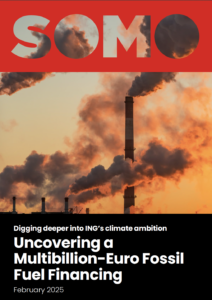
Digging deeper into ING’s climate ambition
Uncovering a multibillion-euro fossil fuel financing

Key findings:
- ING’s financing of Upstream Oil & Gas companies expanding production and infrastructure is 10.6 times higher than it reports: ING claims to have €2.5 billion in outstanding loans to companies involved in Oil & Gas extraction or new field development, as per its 2023 annual report. However, our investigation reveals that the actual figure is a staggering €26.4 billion.
- ING’s inadequate calculation methodology: ING uses a very narrow definition of upstream in its reporting, looking only at the company classification code and not whether a company is starting new Oil & Gas fields.
- Continued support for new Oil & Gas projects: Despite global bank finance for fossil fuels trending downwards, ING continues to fund Oil & Gas companies launching new projects, more so than other large banks on average.
- Long-term fossil fuel commitments: ING holds 45 active deals with Oil & Gas companies, extending beyond 2040. Of these, five were signed in 2024, and one ending in 2054.
-
 Digging deeper into ING’s climate ambition (pdf, 1.99 MB)
Digging deeper into ING’s climate ambition (pdf, 1.99 MB)
Our new investigation, in collaboration with Milieudefensie, takes a closer look at ING’s financing of polluting industries. This report provides an in-depth analysis of ING’s decarbonisation claims, comparing its loan book and bond underwriting with other major European peer groups (peers) and Global Systemically Important Banks (G-SIBs peers).
We focused on Oil & Gas companies that have expanded production capacity since 2021, covering both upstream and midstream operations. These investments are critical from a decarbonisation standpoint because they do not align with the International Energy Agency’s (IEA) Net Zero Energy (NZE) 2050 scenario.
Discrepancy in ING’s reporting
While ING reports modest figures for fossil fuel financing, our findings paint a starkly different picture. ING’s 2023 annual report mentions a figure of €2.5 billion in outstanding loans for companies pumping Oil & Gas or starting new fields. At year-end 2023, our reconstruction of ING’s financing of companies that continue to expand Oil & Gas production and infrastructure indicates total outstanding financing (loans and bonds) of EUR 26.4 billion. That’s 10.6 times higher than what ING reports.
Additionally, our research shows that ING continues to finance loans and bonds for expanding Oil & Gas companies. ING has provided 134 outstanding bonds and loans to Oil & Gas companies expanding production and infrastructure that will mature after 2030 and 14 active deals that will mature after 2050.
ING chooses wrong calculation and reporting methods
ING uses narrow definitions and methods in its own calculations. For instance, ING defines the term upstream extremely narrowly, using business classifications that capture only one characteristic of a company rather than looking at how the company may actually be expanding its fossil fuel production and infrastructure. It is as if the bank wants to report on its investments in bakeries, but it leaves out the big supermarket chains, which produce more bread than the entire bakery SME sector combined.
In this way, the policy the bank has made to phase out upstream is ineffective. This policy already backfires on its own definition and calculation methods.
ING vs. Global peers
Unlike many global banks reducing their fossil fuel exposure, ING has increased its financing for Oil & Gas companies since 2016. By 2024, ING’s share was 2.5 per cent higher than in 2016, the year after the Paris Agreement. Meanwhile, the majority of its self-selected peers and other G-SIB banks were able to reduce their portfolios more in line with the market average.
Our analysis highlights ING’s underperformance from a climate perspective against various benchmarks across sectors. A comparison of ING’s newly committed finance for the Oil & Gas and other carbon-intensive sectors with banks worldwide reveals that ING finances more polluting activities than its peers.
Stop fossil fuel financing
This growing disparity in financing practices raises questions about ING’s ability to genuinely fulfil its responsibility to reach the Paris Agreement climate goals, which demand significant reductions in greenhouse gas emissions. To truly support global climate action, ING must:
- Stop providing new general-purpose financing to companies from polluting sectors.
- Stop providing new financing to fossil fuel companies expanding their fossil production and infrastructure.
- Ensure decarbonisation commitments are backed by transparent, verifiable actions and fully audited.
Banks and other financial institutions must play a crucial role in steering investment away from fossil fuels and ensure that commitments to decarbonisation targets are not just empty promises.
-
 Digging deeper into ING’s climate ambition (pdf, 1.99 MB)
Digging deeper into ING’s climate ambition (pdf, 1.99 MB)
Do you need more information?
-

Rodrigo Fernandez
Senior researcher
Related news
-
Phasing-out fossil fuel subsidies in the Netherlands Published on:
 Rodrigo FernandezPosted in category:Publication
Rodrigo FernandezPosted in category:Publication Rodrigo Fernandez
Rodrigo Fernandez
-

-
Stranded Published on:
 Rodrigo FernandezPosted in category:Publication
Rodrigo FernandezPosted in category:Publication Rodrigo Fernandez
Rodrigo Fernandez


